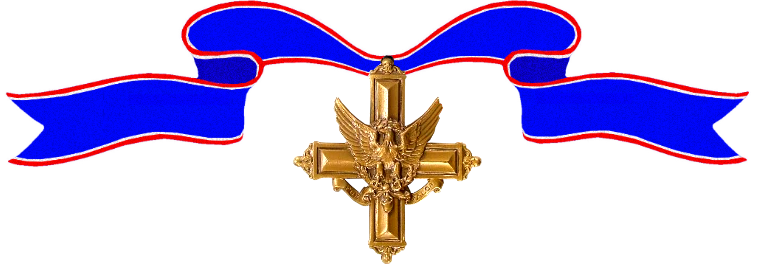The President of the United States of America, authorized by Act of Congress, July 9, 1918, takes pleasure in presenting the Distinguished Service Cross to Captain (Infantry), [then Lieutenant] Dennis Charles Turner, United States Army, for extraordinary heroism in action while serving with Company B, 30th Infantry Regiment, 3d Division, American Expeditionary Forces, near Mezy, France, 15 July 1918. Although completely surrounded and his ammunition exhausted, Captain Turner refused to surrender. Assembling his platoon of about 18 men, he made a dash for our lines, through the enemy’s machine-gun and rifle fire, and by taking advantage of all available cover and grenades and ammunition, found on the way, succeeded in joining our troops.

Awards Received
-

Silver Star
-
Silver Star
Service:
United States ArmyRank:
Captain (Infantry), [then Lieutenant]Regiment:
30th Infantry RegimentDivision:
3d Division, American Expeditionary ForcesAction Date:
July 15, 1918
Headquarters, 3d Division, A.E.F., Citation Orders No. 22 (July 8, 1919)By direction of the President, under the provisions of the act of Congress approved July 9, 1918 (Bul. No. 43, W.D., 1918), Captain (Infantry), [then Lieutenant] Dennis C. Turner, United States Army, is cited by the Commanding General, 3d Division, American Expeditionary Forces, and a silver star may be placed upon the ribbon of the World War I Victory Medals awarded him. While serving with Company B, 30th Infantry Regiment, 3d Division, American Expeditionary Forces, Captain Turner was in command of one platoon of his company, 52 men, on the Marne near Mezy, France, on 15 July 1918. His platoon occupied a position in a ravine about 100 yards from the river and parallel to it. The enemy began an intense artillery preparation at 12 o’clock, midnight. All wooded positions and depressions in the terrain, including the position occupied by Lieutenant Turner’s platoon, were bombarded continually by the enemy’s trench mortars until 3 o’clock A.M. At 2 o’clock the enemy supplemented the artillery fire with a machine gun barrage which lasted for one hour and covered all the low ground parallel to the river. Under the protection of their barrage the enemy constructed pontoon bridges at various points along the river and began to cross in force at 3 o’clock. One of the bridges was placed across the river to the right front of Lieutenant Turner’s platoon at a range of about 250 yards. From his position he directed an effective fire upon the crossing troops. Those of the enemy who were successful in crossing, took advantage of the available cover, a wheat field, moved around the right flank of his platoon and formed for attack in his right rear cutting him off from support of his own troops. In the meantime small bodies of the enemy had crossed the river several hundred yards to the left rear of Lieutenant Turner’s position and had formed for attack between his position and our line of resistance. Although now completely surrounded and his ammunition exhausted he refused to surrender. He assembled his platoon, consisting now of only 18 men, and taking advantage of available cover and making use of grenades and ammunition wherever found, led it with dash and courage through the enemy’s machine gun and rifle fire past their lines and joined his own troops. [A Distinguished Service Cross was awarded for this action.]

